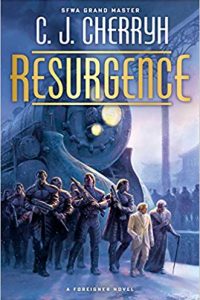Gary K. Wolfe Reviews Spear by Nicola Griffith
 Spear, Nicola Griffith (Tordotcom 978-1-250-81932-1, $19.99, 192pp, hc) April 2022.
Spear, Nicola Griffith (Tordotcom 978-1-250-81932-1, $19.99, 192pp, hc) April 2022.
In terms of actual scholarship, it’s probably a good thing that historians have largely abandoned the pejorative “Dark Ages” to describe the early medieval period, since it had become such a broad-brush pop-culture shorthand that it eventually seemed to refer to everything between the fall of Rome and the rise of Amazon. For fantasy writers, on the other hand, the idea of an ancient demon-haunted world full of sorcerers and plagues has often seemed like catnip – at least until a few of them began looking at the same historical evidence that led historians to reconsider the period. That evidence can still be comparatively scant when looking as far back as 6th-century Wales or 9th-century Iceland – the focus, respectively, of Nicola Griffith’s Spear and Sarah Tolmie’s All the Horses of Iceland – but it doesn’t mean that historical research is pointless in such tales. Instead, in quite different ways, each author shows us how a vividly rendered archaic world can be made to feel like fantasy even before the supernatural fireworks show up.
Griffith, whose meticulous research into 7th-century Britain helped make Hild one of the more compelling recent historical novels, is well aware of this, as she explains in detail in her author’s note to Spear, her equally compelling re-imagining of Arthurian legends. Spear is told from the point of view of a young girl who, disguised as male, grows up to become a version of Parsifal or Perceval – here called Peredur, which can be translated as “spear”. By setting her tale in sixth-century Wales, Griffith uses largely Welsh equivalents of familiar Arthurian figures; Sir Kay becomes Cei, Guinevere Gwynhwifar, Merlin Myrddyn, Arthur himself Artos, etc. (though Nimuë remains Nimuë, as Peredur’s main love interest). Camelot becomes the actual Welsh region of Caer Leon. Griffith also tosses in bits of Irish mythology, such as the Tuath Dé, which provides the four treasures – a stone, a sword, a cup, and a spear – that play a central role in Peredur’s adventures.
All this has the useful effect of defamiliarizing the familiar and – along with significant genderqueer character development and the refreshingly casual portrayal of disability – making the tale very much Griffith’s own. We first meet Peredur as a nameless child living with her mother in a remote cave whose chief feature is an enameled iron bowl, about which the mother offers occasional cryptic remarks. As in Hild, the girl’s acute observations of the natural world and its changing seasons are rendered in luminous, rhythmic prose, and her growing awareness of the outside world – secretly observing new settlers, visiting a village for the first time, learning to read, most importantly coming across the corpse of a knight and collecting his sword and spear – is elegantly paced. These lyrical early passages can be so mesmerizing that it’s almost jarring when that pacing rapidly accelerates after Peredur leaves home. In a matter of a few pages she decides to live as a boy, gets a job, learns her weapons, finds her first girlfriend, and even assists the king’s Companions (including Cei and Lance) in fighting off bandits. She determines to follow them to Caer Leon and join the service of the king.
Once she arrives there and grows close to Nimuë, she (and we) begins to learn the real stakes of the tale, as well as clues to some puzzles that might have been bothering readers so far – such as how Peredur became such a skilled fighter with virtually no training, who her long-missing father might be, and why those familiar Arthurian treasures (sword, stone, cup, spear) are so important. Griffith makes a few shrewd nods toward later iterations of the myth, such as the view of the “Christers” that the cup is actually the Holy Grail (Peredur’s effort to understand Christian prayer is one of the wittier moments here), but her versions of Gwynhwifar, Myrddyn, Nimuë, and Artos himself are so intriguing that it’s easy to put aside what we thought we knew of these overfamiliar figures. By the time the novella zips toward its conclusion, with Peredur finally defining her own quest for identity and racing to prevent a murder, what had begun as a lyrical bildungsroman drenched in the natural world has somehow turned into a fast-moving, violent suspense tale with stakes that are at once epic and personal. By then, it no longer feels at all like yet another iteration of familiar matters, but a marvelously concise epic that is entirely Griffith’s own.
Gary K. Wolfe is Emeritus Professor of Humanities at Roosevelt University and a reviewer for Locus magazine since 1991. His reviews have been collected in Soundings (BSFA Award 2006; Hugo nominee), Bearings (Hugo nominee 2011), and Sightings (2011), and his Evaporating Genres: Essays on Fantastic Literature (Wesleyan) received the Locus Award in 2012. Earlier books include The Known and the Unknown: The Iconography of Science Fiction (Eaton Award, 1981), Harlan Ellison: The Edge of Forever (with Ellen Weil, 2002), and David Lindsay (1982). For the Library of America, he edited American Science Fiction: Nine Classic Novels of the 1950s in 2012, with a similar set for the 1960s forthcoming. He has received the Pilgrim Award from the Science Fiction Research Association, the Distinguished Scholarship Award from the International Association for the Fantastic in the Arts, and a Special World Fantasy Award for criticism. His 24-lecture series How Great Science Fiction Works appeared from The Great Courses in 2016. He has received six Hugo nominations, two for his reviews collections and four for The Coode Street Podcast, which he has co-hosted with Jonathan Strahan for more than 300 episodes. He lives in Chicago.
This review and more like it in the March 2022 issue of Locus.
 While you are here, please take a moment to support Locus with a one-time or recurring donation. We rely on reader donations to keep the magazine and site going, and would like to keep the site paywall free, but WE NEED YOUR FINANCIAL SUPPORT to continue quality coverage of the science fiction and fantasy field.
While you are here, please take a moment to support Locus with a one-time or recurring donation. We rely on reader donations to keep the magazine and site going, and would like to keep the site paywall free, but WE NEED YOUR FINANCIAL SUPPORT to continue quality coverage of the science fiction and fantasy field.
©Locus Magazine. Copyrighted material may not be republished without permission of LSFF.








